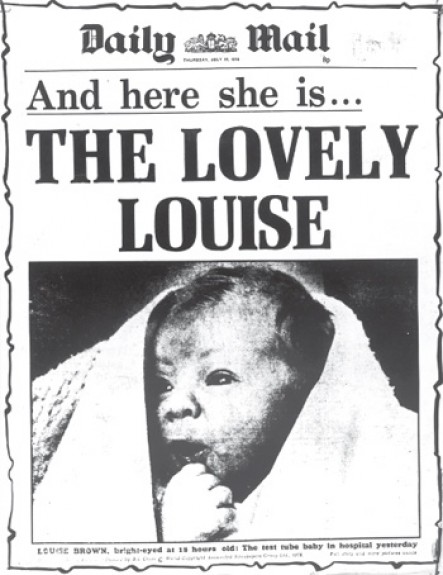Robert Edwards, 87, Helped Bring Millions of Babies Into This World
In vitro ferlization has helped millions of people have babies. The techniques co-founded just died

Born July 25, 1978, Louise Brown was the first baby born to in vitro fertilization, a technique developed by Robert Edwards and Patrick Steptoe. Photo: Nobel Prize.org
Likely no one on Earth has done as much to bring babies into this world as Robert Edwards, a famed English scientist who died yesterday at age 87.
Edwards, along with his long-time research partner Patrick Steptoe, developed the technique of human in vitro fertilization—a way to artificially fertilize a woman’s eggs while they’re outside of her body. After decades of research, the first baby from in vitro fertilization was born on July 25, 1978. The work earned Edwards a Nobel Prize in Medicine in 2010 and went on to change the fates of millions of families who struggled with infertility.
Since Louise Brown was born in 1978, says the Associated Press, the “European Society for Human Reproduction and Embryology estimates about five million babies have been born using the technique, which creates embryos in the laboratory before transferring them into a woman. Experts say about 350,000 babies are born by IVF every year, mostly to people with infertility problems, single people and gay and lesbian couples.”
Edwards’ influence on families’ lives is likely matched by the controversy that surrounded his work.
Edwards and Steptoe, says Martin Johnson for the Guardian, “faced obstacles that would have deterred a less determined pair, for not only was the work demanding clinically and scientifically, but they were given no financial support from UK funding bodies, and were regularly attacked not just by religious leaders and the press but also by most of their scientific and clinical colleagues. As a graduate student of Bob’s, I well remember being ostracised at meetings and in the departmental tearoom for my association with him.”
The technique stirred, and continues to stir controversy in some circles, says Al Jazeera. In the early days of his research, Edwards and Steptoe were “accused of playing God and interfering with nature,” says the AP. Following Edwards’ Nobel Prize win, his research was denounced by the Vatican, and praised by his country: “In 2011, Edwards was knighted by Queen Elizabeth II “for services to human reproductive biology.””
“Like so many pioneers of science,” says the New York Times, “the two men achieved what they did in the face of a skeptical establishment and choruses of critics.”
More from Smithsonian.com:
Iron Lady Margaret Thatcher Dies at Age 87
The Man Who Deserved ’66 Percent of the Credit’ for Cloning Dolly Has Died.
The Man who “Discovered” Cold Fusion Just Passed Away
/https://tf-cmsv2-smithsonianmag-media.s3.amazonaws.com/accounts/headshot/smartnews-colin-schultz-240.jpg)
/https://tf-cmsv2-smithsonianmag-media.s3.amazonaws.com/accounts/headshot/smartnews-colin-schultz-240.jpg)